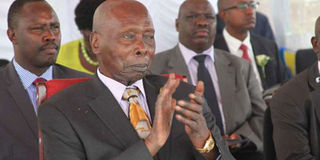Kenya goes back to its ‘mating ritual’ with Western donors

Former President Daniel Moi cheers as a choir entertains guests at Sunshine School in Nairobi on April 3, 2016 during a thanksgiving service. During the Nyayo era, the placatory rabbit could be a promise to hold multiparty elections or to liberalise certain sectors. PHOTO | ANTHONY NJAGI | NATION MEDIA GROUP
What you need to know:
- When the Kanu regime was ousted in 2002 and the Mwai Kibaki administration gained power, Western donors heaved a sigh of relief.
- What we are witnessing under the Jubilee administration is a government that is clumsily performing another mating ritual with Western donors.
The Economist once characterised the Moi government’s relationship with Western donor countries as a “mating ritual” that involved the following five steps: step one: Kenya wins its yearly pledges of foreign aid.
Step two: the government begins to misbehave, backtracking on economic reforms and behaving in an authoritarian manner.
Step three: a new meeting of donor countries looms with exasperated foreign governments preparing their sharp rebukes.
Step four: Kenya pulls a placatory rabbit out of the hat.
Step five: the donors are mollified and the aid is pledged again.
During the Nyayo era, the placatory rabbit could be a promise to hold multiparty elections or to liberalise certain sectors.
The problem was that, in the eyes of Western donors, these reforms often did not go far enough; Moi always found a way to subvert them, either by rigging elections or by making personal profit from the sale of State assets and engaging in nepotistic or corrupt practices that made a mockery of economic liberalisation.
When the Kanu regime was ousted in 2002 and the Mwai Kibaki administration gained power, Western donors heaved a sigh of relief.
However, Kibaki had other plans. He decided to “look East” towards China, particularly when it came to infrastructure development.
His economic policies were pegged not so much on Western aid but on improving economic growth and expanding the tax base, with the ultimate aim of making Kenya less aid-dependent.
ALL OVER AGAIN
These policies did not necessarily result in less aid being given to Kenya; on the contrary, aid to Kenya increased seven-fold to more than $2 billion in 2011 from a paltry $300 million in 1999.
This surge in aid can be partly attributed to a United States-funded programme initiated by President George Bush to tackle HIV/Aids and also to the fact that, after the violent aftermath of the 2007 elections, Western donors had an opportunity to reclaim their “sphere of influence” in the country by becoming more involved in governance issues, which were deemed to be critical in avoiding another bloodbath in future elections.
Given the strategic importance of Kenya to Western economic and security interests, aid (or what the British diplomat Robert Cooper referred to as “soft power”) was considered essential to maintaining these interests.
What we are witnessing under the Jubilee administration is a government that is clumsily performing another mating ritual with Western donors, with the sharp rebukes this time coming not from the donors but from the President himself.
The Head of State recently warned Western countries, the US in particular, not to interfere in the 2017 elections by pouring money into civic education activities.
What irked Uhuru Kenyatta was not that foreigners were funding these activities but that some of the funds were being channelled through civil society organisations instead of the government.
So, for instance, he was not angered by the fact that Western donors have put billions of shillings for the 2017 elections into a basket fund managed by the United Nations Development Programme (UNDP).
Neither did he object to these same donors pouring millions of dollars into the Independent Electoral and Boundaries Commission (IEBC) — even though this electoral body has been mired in corruption scandals and has lost much of its credibility.
So, the game is being played by both sides — donors continue pouring aid to Kenya despite the bad track record of its electoral body and the Kenyan Government rebukes the same donors, not for funding the same electoral body but for funding election-related civic education activities, which ideally the government should be paying for and carrying out.
CHINA'S INTENTION
If the President doesn’t want any foreign interference in the 2017 elections, why has he not objected to the funding of IEBC by foreign donors?
And if he is really sincere about the country’s independence from foreign interests, why is it that at every high-level Jubilee meeting, members of the Chinese Communist Party are not only given a seat at the high table but are also invited to speak?
Is China not a foreign country? Or it is because the Chinese look the other way when the Kenyan Government misbehaves?
If anything, Kenya should be wary of China’s rising influence, which is neither altruistic nor benevolent.
The Chinese are in Kenya because of their economic interests. Period.
Mind you, Kenyan taxpayers will soon be repaying China’s humongous loans to Kenya, thanks to Jubilee.





